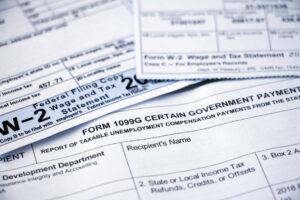In California, the distinction between 1099 and W-2 employment statuses is a critical aspect of employment law, affecting how workers are taxed, paid, and their eligibility for benefits. This blog aims to shed light on these two classifications, helping both employers and workers understand their implications. Contact PLBH at (800) 435-7542 to learn more today.
The Essence of W-2 Employment
W-2 employees are typically what one might consider traditional employees. Employers who hire W-2 workers are responsible for withholding income taxes, Social Security, and Medicare from their wages. Additionally, W-2 employees are typically eligible for a range of benefits, including unemployment insurance, worker’s compensation, and health insurance. They are also protected under various labor laws, including minimum wage and overtime regulations.
1099 Independent Contractors: A Different Category
In contrast, 1099 workers are classified as independent contractors. These individuals are not considered employees of a company but rather, they provide services on a contractual basis. Unlike W-2 employees, 1099 workers are responsible for paying their own taxes, including self-employment tax. They are not eligible for benefits provided to W-2 employees and are not covered by most labor protections.
Key Differences in Rights and Protections
The primary differences between these two classifications lie in tax implications, eligibility for employment benefits, and labor rights protections. For instance, W-2 employees have the right to a minimum wage and overtime pay, while 1099 contractors do not. Additionally, employers contribute to payroll taxes for W-2 employees but not for 1099 contractors.
Criteria for Classification
Determining whether a worker should be classified as a 1099 or W-2 employee is based on several factors. This includes the level of control the employer has over the worker, the financial aspects of the worker’s job, and the nature of the relationship, including whether there’s a contract and if the worker is eligible for employee benefits. Misclassification can lead to legal and financial repercussions for employers.
The Importance of Accurate Classification
It’s crucial for employers to classify workers correctly to avoid legal issues. Misclassifying an employee as an independent contractor can lead to penalties, including back taxes and fines. For workers, proper classification ensures they receive the rights and benefits to which they are entitled.
Recent Legal Developments
Recent legal developments in California, including Assembly Bill 5 (AB5), have put a spotlight on worker classification. AB5 introduced stricter criteria for classifying workers as independent contractors, aiming to extend labor protections to more workers. Understanding these legal changes is essential for both employers and workers in California.
Consulting with Legal Experts
Due to the complexities and potential legal ramifications of worker classification, consulting with legal experts is often advisable. Law firms like PLBH specialize in employment law and can provide guidance to ensure compliance with California’s labor laws. For more information or assistance, you can reach out to PLBH at (800) 435-7542.

